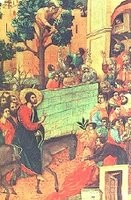
Holy Week begins on a triumphal note. We the disciples shout our hosannas, and we watch as the world praises our beloved Messiah. Everyone is at last giving Him — and His followers — the right kind of attention.
This is probably the way most of us would have planned the culmination of Jesus’ ministry, if we’d been given the chance.
It is, however, only the beginning of Holy Week; and we know what’s soon to follow: betrayal, suffering and death. Where we would have called for a reprise — a Palm Friday — God willed something far better. We call it Good Friday, and it is the only way to the glories of Easter Sunday.
We may recognize a pattern here. Think, for example, of the Church’s recent triumphs. For me, a great moment — a triumphal moment — came as Pope John Paul II lay dying. The world poured out its love. Young people filled the streets of Rome. All the media trained their cameras on the Holy See. The afterglow remained through the early years of Pope Benedict’s pontificate. I stood with a vast crowd on the White House lawn to sing “Happy Birthday” to His Holiness. Our song leader was no less than the president of the United States. Many people, it seemed, were ready to give the pope — and give us — the right kind of attention.
Lately, though, the newscasters and pundits have returned to their former harshness toward Catholicism. And the people in power are inclined to make us feel the edge of our Good Friday, removing “conscience clauses” that protected Catholics who worked in health care, for example, and deregulating the experimental use of human embryos.
Which is our moment, my friends? When the culture gives us palms? Or when the culture gives us the back of its hand?
The answer lies in Holy Week. You and I must truly give ourselves to the season this year. We must live it deeply, meditating on the Word, praying the liturgy with body and soul.
Use Holy Thursday as the key. What, after all, made Calvary a sacrifice? The event did not meet any of the sacrificial requirements of the Jerusalem Temple. It seemed to be an ordinary execution — or, at best, a martyrdom to those who were more sympathetic to the victim.
But it was indeed a sacrifice. At the Last Supper he gave his body to be broken, his blood to be poured out, as if on an altar. The Eucharist is ordered to the cross. But the Eucharist is also ordered to the resurrection — a glory we could not have experienced if we had lingered forever in Palm Sunday.
St. Paul knew all this. That’s why his First Letter to the Corinthians could range from the “word of the Cross” in chapter 1 to the Passover in chapter 5 and the Church as Temple in chapter 3, from the Eucharistic treatise of chapters 10-11 to the celebration of the Resurrection of the Body in chapter 15.
It’s the resurrected humanity of Jesus that we consume in our Holy Communion, in the Eucharist. We come to it by way of triumphs, but they are fleeting. We come to it by way of pain, but that, too, will pass. We receive the Host as a pledge of lasting glory, and we have the grace to endure the rest. Here we have no lasting city. But we have hope, because we know Holy Week.
I wish you a blessed season. I beg your prayers. I promise you mine.


